Top-10 Customer Service Software Platforms for Your Company in 2024
Discover the best customer service software platforms and their features.
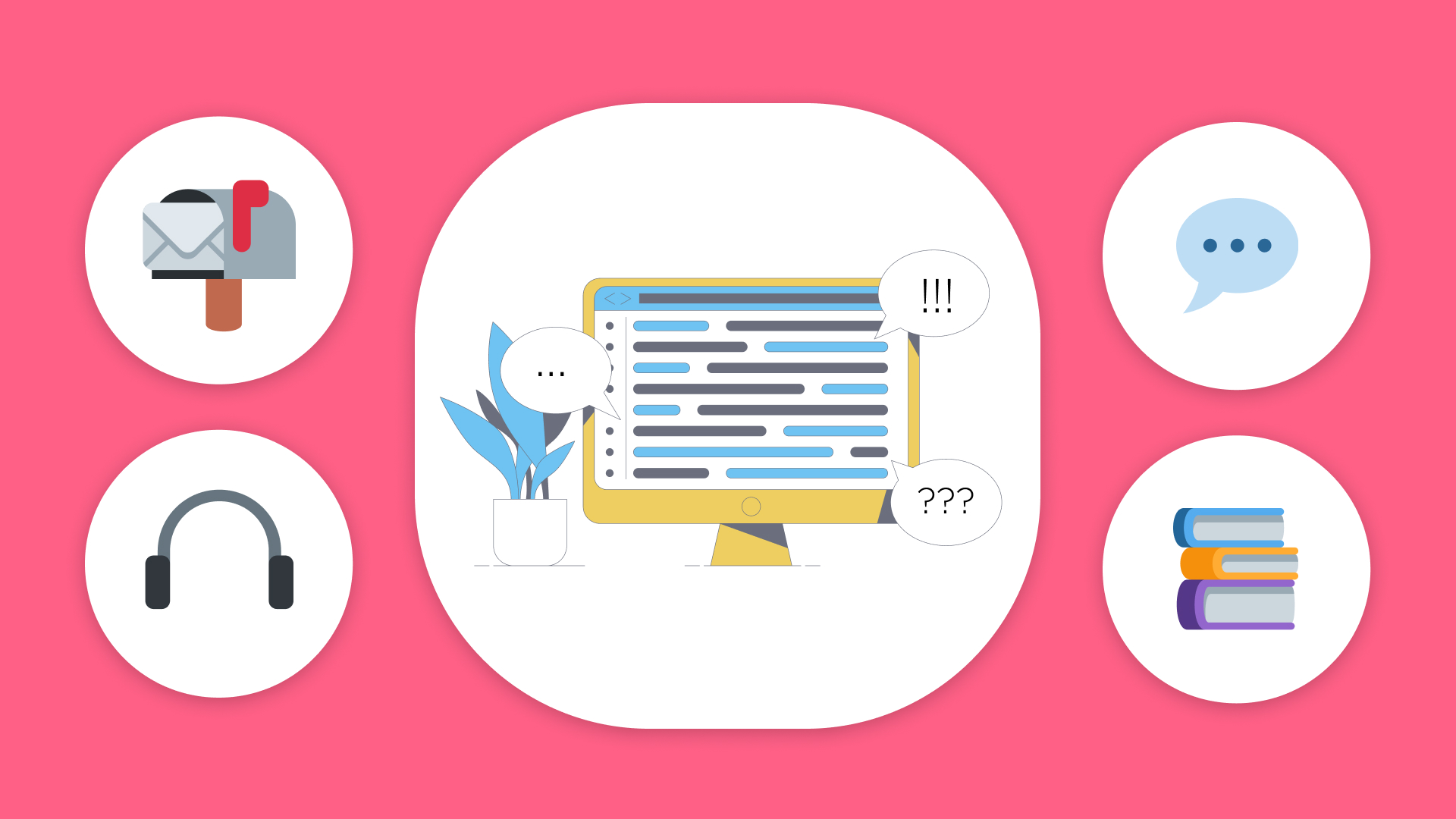
For businesses of almost any size, efficient customer engagement is hardly imaginable without a proper customer service software platform. Studies show that customers satisfied with the quality of customer service are 93% more likely to make another purchase from the company. This clearly shows that the work of your sales and support teams is no less important for the company’s prosperity than that of those who are in charge of the quality of your product or services.
Currently, there is no shortage of solutions on the market that help companies achieve efficient management of customer communication. However, such a wide variety of options makes choosing the best one quite hard. In the article, we’ll review what a customer service platform is, what types of them are available, features they include, as well as the best all-around solutions. In the end, you’ll have a complete and clear picture of how customer service platforms help businesses grow.
Table of contents
What is customer service software platform
Customer service software is a multi-functional platform that helps companies to manage their interactions with customers. This is done by automating workflows (or parts of them), providing analytics on customer preferences and activities, as well as storing all data in a centralized system that is secure and easily accessible by employees according to their permission levels.The results of employing a customer service platform have many aspects to them, just like the platforms themselves. It helps to reach customers more efficiently, track their preferences and make personalized offers. It all leads to better conversion, higher customer satisfaction ratings, and more sales. Let’s take a look at the most prominent types of customer service platforms.
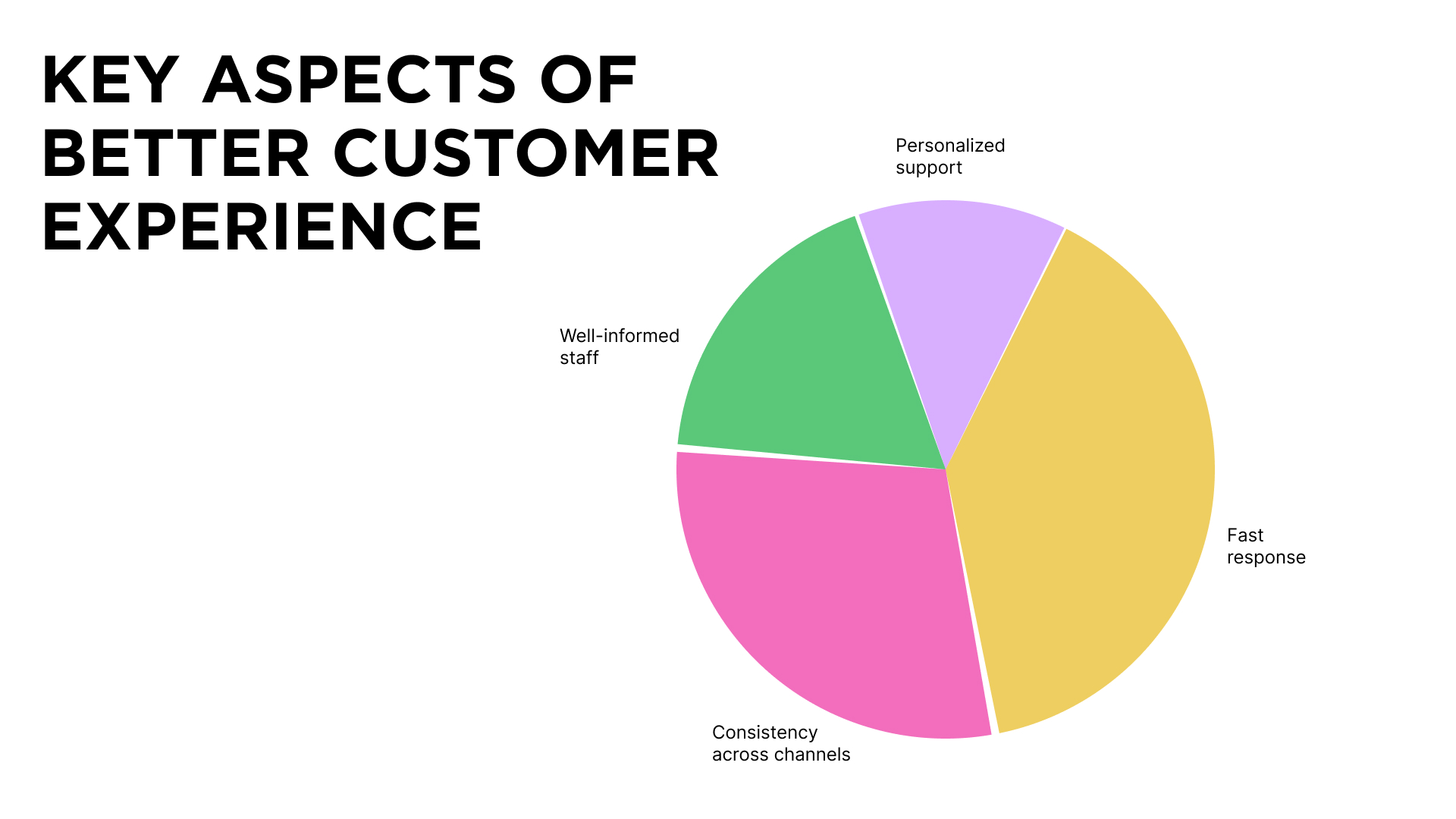
Types of customer support software platforms
Generally, it is possible to distinguish five main types of customer service software, although the majority of platforms are blends of several types.
Shared inbox
Emails like help@companyname or hello@brand are usually managed by a shared inbox solution that allows connecting an email domain to a platform where several people can manage incomings at once. Such CS platforms provide an interface where employees can communicate with customers more conveniently than via a simple email agent, converting every chain of messages into a task that can be assigned to a relevant employee. Every email conversation is linked to a relevant customer profile and previous conversations, so that support can see their history of interactions with a company and provide consultations efficiently. There is also support for internal comments on every conversation so that several employees can discuss complex issues right in the ticket without customer involvement.
Helpdesk
The major goal of helpdesk CS solutions is to assist customer support teams with ticket administration, performance monitoring, and pinpointing the most frequent issues. Such software is critical for SaaS and eCommerce enterprises that serve individual clients from various places, whether inside a country or across the world. The solution has many similarities to a shared inbox — it transforms incoming inquiries into tasks or tickets, but comes with wider functionality. The helpdesk supports multiple communication channels in one interface and provides such features as ticket prioritization, and extensive analytics of employee performance (response time, average number of solved tickets daily) among others.
Knowledge base
This type of CS platform is like a virtual encyclopedia that provides both answers to frequently asked questions and comprehensive documentation on products. Today, knowledge bases use the latest developments in artificial intelligence to automatically update information and help customers narrow their search and find exactly what they are looking for. Knowledge bases are useful to provide technical specialists with instructions on how to use a company's services and decrease support team load. Also, many customers prefer finding answers to their questions themselves, instead of interacting with customer support specialists.
Messaging and chat platforms
The ongoing digital trend of fast-paced communication in messengers makes more and more companies contemplate the ability to interact with clients in real time, providing alternatives to phone and email support channels. For example, live chat embedded on a website leaves 73% of customers satisfied, compared to 61% for email and 44% for phone interactions. To implement these solutions and use them efficiently, messaging platforms provide quick access to customer profiles, their previous conversations, and internal collaboration features for instances when an inquiry should be discussed with other employees apart from the assigned one.
CRM
Customer relationship management systems (CRM) are CS software that is focused on nurturing long-term relations with customers and increasing business profitability. Such solutions include extensive tools for sales, such as Deal cards and sales pipelines that allow tracking interactions with prospects. CRM systems also record all customer interactions so that agents can better help their clients and effectively resolve support inquiries. Detailed analytics built into CRM platforms help companies gain useful insights about the buying patterns of customers, their interests, and demographics. Also, CRM and messenger integration makes it possible for employees to use chat support platforms to communicate with clients who contact the business via WhatsApp or Instagram directly in CRM.
Customer service software deployment models
CS platforms also differ in terms of how they are architectured, deployed, and integrated into the company’s infrastructure. Let’s take a brief look at the main types of these models.
- Cloud-based (On demand). This is a SaaS type of software that is usually provided on a subscription model basis. Generally speaking, a company that uses the CS platform rents both software and hardware, including storage space, to run the platform from the software’s vendor.
- On-Premise. This type usually involves purchasing a lifetime license to install and use CS software on the company’s servers and hardware. Here, the vendor is much less involved in the maintenance and support of the system.
- Hybrid usually means purchasing a CS platform's lifetime license and running it on third-party hardware, for example, a data center’s. This provides both cost efficiency (in the long run, a subscription is more expensive than a one-time purchase) and flexibility (scaling own infrastructure is harder than expanding in the cloud).
Reasons for businesses to use customer service platforms
The versatility of customer service solutions is the primary reason for their popularity since they allow companies to achieve so much more. Almost every aspect of every stage of the customer journey can benefit from the proper implementation of a CS platform.
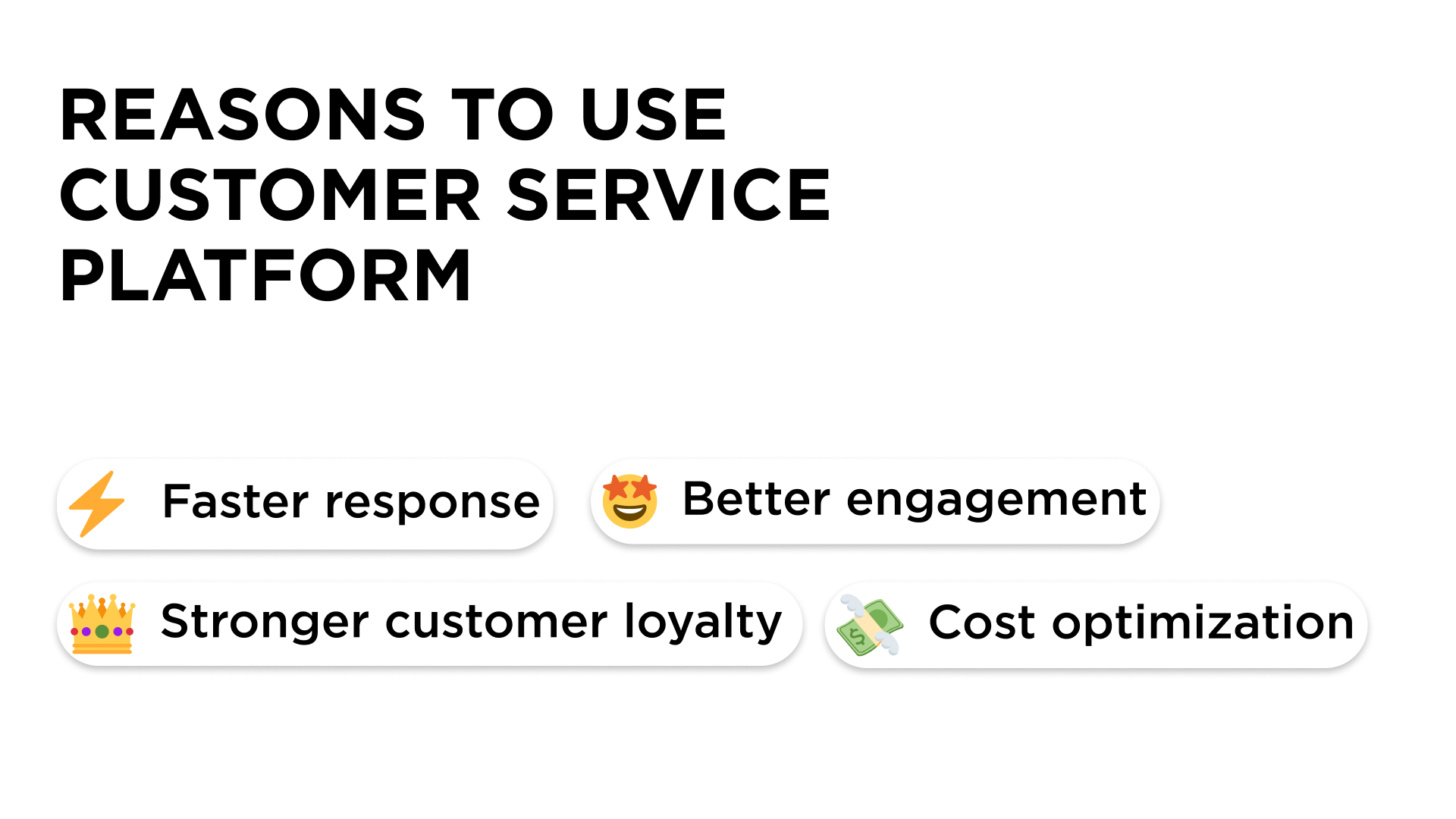
Faster resolution of issues
With message routing available on CS platforms, every customer inquiry finds its way to a competent manager quicker. Also, when customer inquiries from every channel (whether a live chat widget or WhatsApp Business) can be viewed within a single interface, there is much less chance of losing any of them, which often negatively impacts a company's reputation.
Stronger customer relationships and loyalty
Today, customers expect vendors to know their tastes and what they like. Customer service solutions help companies to learn more about their client base. Through analytics linked to individual profiles, marketers can define audience segments and create targeted campaigns or personalized offers, based on their preferences and shopping patterns. All of this leads to a stronger bond with clients and fewer chances of them leaving to competitors.
Engage more with customers
Actually, clients enjoy conversations with brands they love, and customer service platforms make it easier to create meaningful interactions. For example, a company rep can reach out to a website’s visitor and offer advice on products they’re browsing. Also, such platforms as Umnico offer an ability to reach out to clients first via messengers, promoting dialogues that are more engaging than a traditional email campaign.
Optimize cost with self-service and automation
The tools of customer service platforms can take a significant part of the daily routine of answering frequent questions from the shoulders of support agents. A knowledge base that includes how-to articles, tech specifications, and forums where community members can help each other is incredibly helpful in solving minor issues. Meanwhile, template answers in customer communication channels can effectively resolve some issues without any human involvement, allowing specialists to focus on complex issues or VIP customers.
Features to look for
When choosing a customer service solution, a responsible person should pay special attention to the features provided by the platform, so that the chosen solution fits the business workflow and goals.
Ticketing system, used for organizing customer inquiries, is arguably the most important element of a customer service platform. This feature transforms every incoming message into a ticket or task and merges several messages from a customer into a single ticket. Support ticketing software also should provide the ability to assign a ticket to a relevant specialist, as well as add tags for categorization. Other important features include search by ticket content to quickly find all inquiries that include certain keywords and analytics to measure employee performance and discover the most popular types of inquiries.
Task management. Since lead nurturing can be viewed as a set of tasks for sales reps and account managers, a customer service platform must have an intuitive tool to track customer interactions and save any details on them in the system. It is also necessary for managers to be able to create task assignments and set reminders. This way, for example, an account manager can create a task “send an email proposal”, be reminded about it, and save customers' replies on the platform so they can be viewed by other employees.
Analytics dashboard. Successful businesses are always built on accurate numbers. With them, management can make sound changes to the company's operations, strategy, and marketing tactics. That is why a customer support platform should track an extensive list of indicators on customer relations and provide a comprehensive overview of them. These should include metrics on incoming inquiries: amount, the most popular issues, categorization by source, etc.; employees’ performance: average response time, number of tickets solved daily, and customer rating.
Integrations with communication channels. In a way, a customer service platform can be viewed as an all-in-one inbox that unites all channels used by a company to stay in touch with its customers into a single view. This functionality is provided by APIs (application programming interfaces) that allow the integration of instant messengers and social media accounts into the CS platform. When choosing a solution, it is important to pick one that provides stable APIs for integration to avoid regular disconnections in the future.
For example, Umnico messaging platform supplies official APIs for WhatsApp and Instagram integration with 99.9% uptime and extensive functionality.
Automated reply scripts. By using templates, customer service platform users can create a library of read-made answers to frequent questions and insert them into conversations with clients with a single hotkey. Also, in the era of AI and automation, not every single issue demands the participation of a human operator. Chatbots and even simple scripting can effectively substitute a support agent when, for example, a customer requests to provide shipment tracking details or wants to learn their account status. The platform recognizes keywords used in a customer’s inquiry and provides several options they can choose from or simply an answer.
Top 10 customer service platforms
Having read this far, we suppose it is time to get more familiar with market leaders in the field of customer service platforms.
LiveAgent
LiveAgent is a customer platform of choice for many small and medium-sized companies in the e-commerce, telecommunications, and SaaS industries. The solution provides a fully-featured helpdesk and ticketing software for streamlined customer support, as well as an easy-to-install widget to serve as a customer service chat platform. Users can also set up a call center with the platform to handle inbound calls and preview customer data in one place. LiveAgent supports nearly 200 integrations with other business software and social media channels.
Pricing: After a 14-day free trial, companies can choose one of the pricing plans, starting from a monthly fee of $15 per agent.
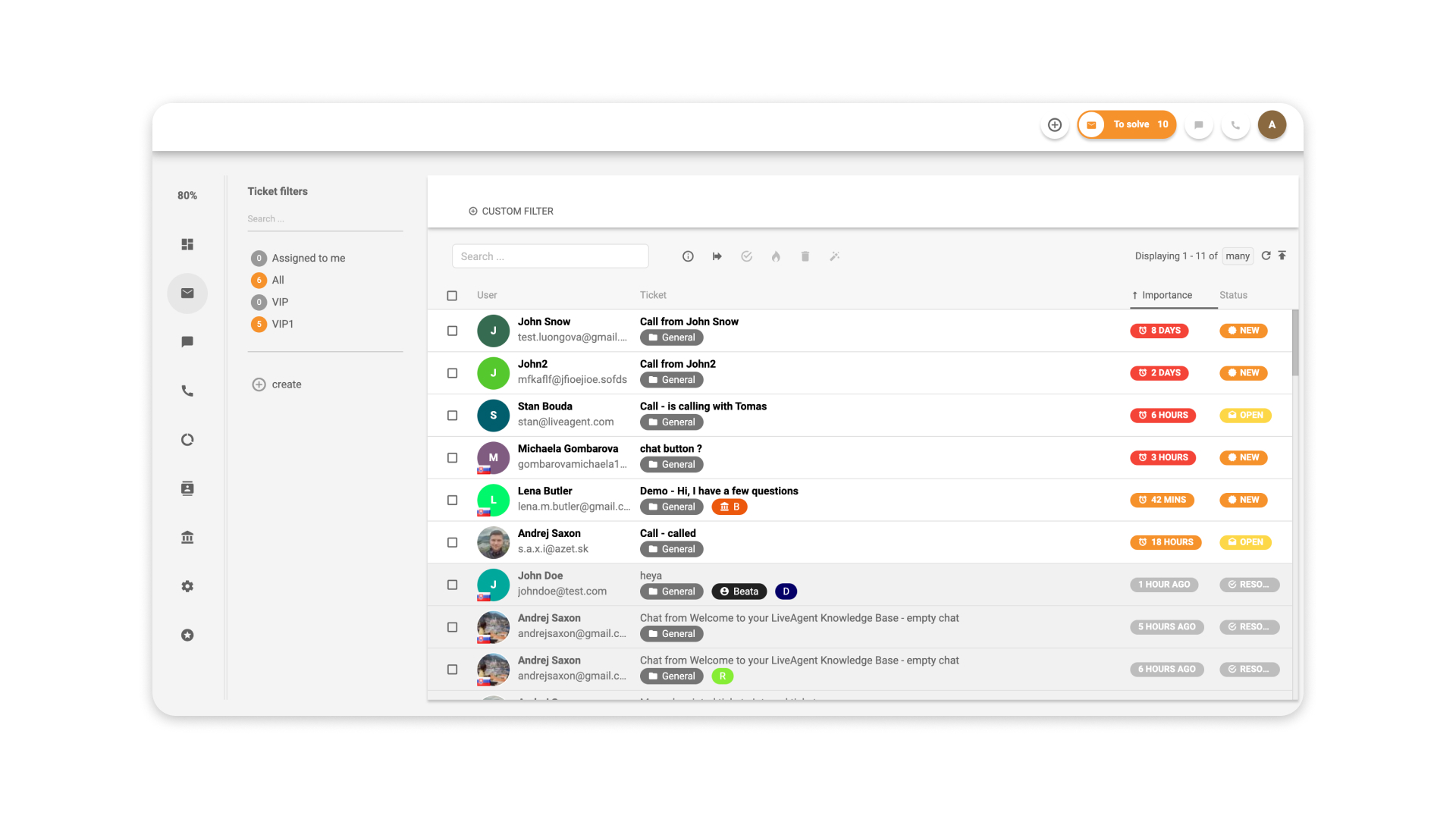
Zendesk
Zendesk is a full-service customer support platform intended to be used by companies of all sizes. The platform’s key component is Agent Workspace — a dashboard where agents can have multiple related conversations and chats within the same support inquiry. This and other Zendesk features allow employees to adopt a customer-focused approach and provide faster and more customized service.
Pricing: The platform provides multiple subscription options, from separate Sales and Support tools (starting at $19) to the more universal Zendesk Suite (starting at $49).
HubSpot Service Hub
One of the most popular platforms for customer service, HubSpot Service Hub assists enterprises in developing strong relationships with customers while increasing the efficiency of sales and support teams. Hubspot customer service solution comes with shared inbox functionality that allows connecting email, live chat support software, Facebook Messenger, and other channels; AI-powered insights on team’s performance; customizable customer service survey tools; as well as automation.
Pricing: The cost of Service Hub differs depending on the number of users and features and starts from $45 per month if billed annually.
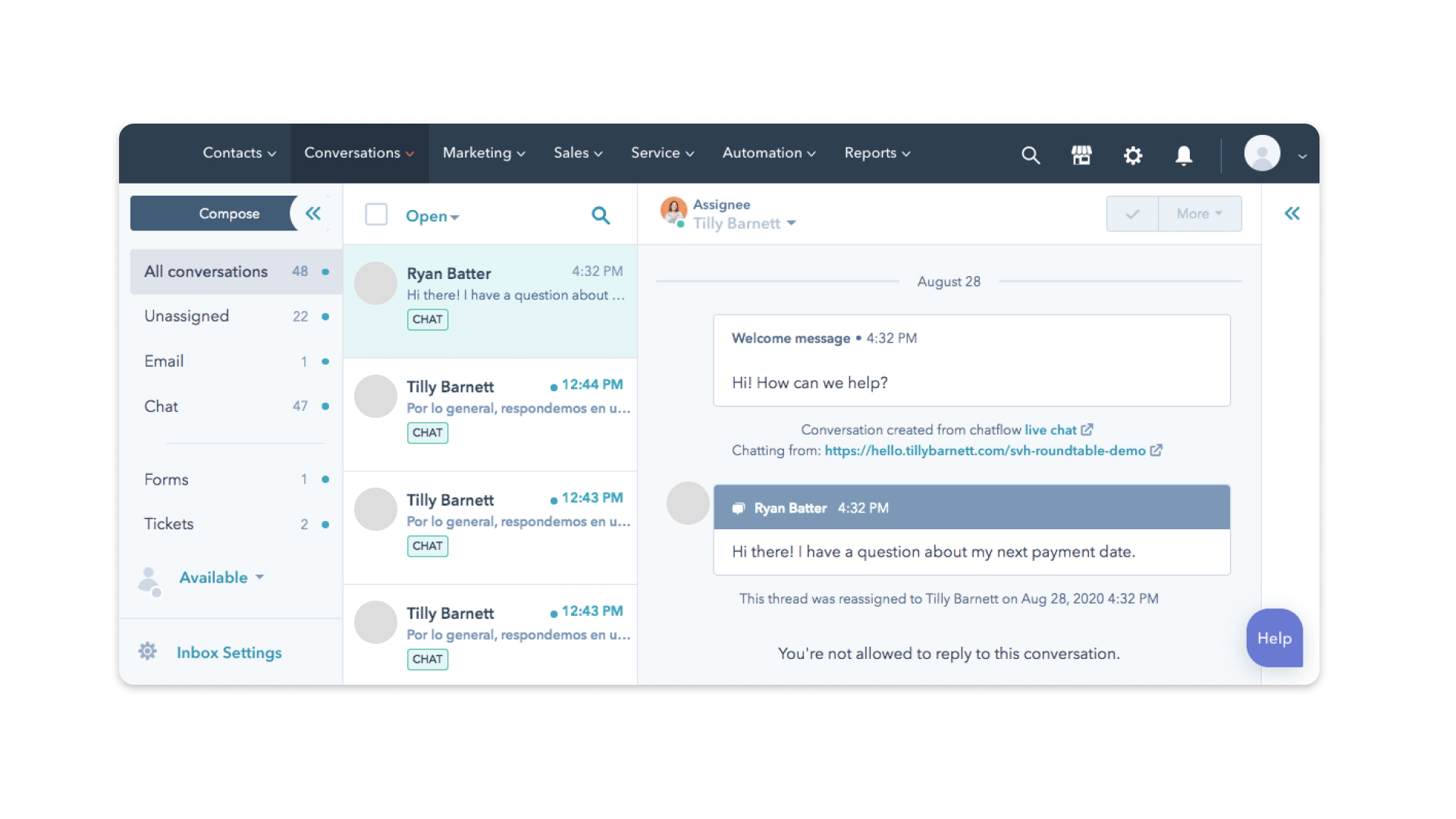
Bitrix24
Bitrix24 has everything for managing customer relations and communicating with clients. The solution comes with a pipeline and analytics tools for sales, a task manager for efficient teamwork management, and a customer care platform for handling client inquiries from every communication channel, such as email, live chat, web forms, and others. B24 supports ticket queueing and routing, setting up templated responses, tracking SLA times, and other useful features. It also has a set of features that the HR department would surely appreciate, such as the company's structure.
Pricing: Bitrix24 has 4 main pricing plans, with the most basic one starting at $46 per month if billed annually.
Freshdesk
Freshdesk is a popular cloud-based helpdesk software that helps businesses of all sizes and industries provide excellent customer support. It offers a wide range of features to streamline your support operations, including ticketing, automation, reporting, self-service portal, omnichannel support, collaboration, customization, and security.
By providing efficient and responsive support, Freshdesk can help you improve customer satisfaction and loyalty. Its automation features can help you save time and improve your team’s productivity, reducing support costs by streamlining company’s operations. Freshdesk’s reporting and analytics also provide valuable insights into your support performance.
Pricing: Freshdesk offers a free trial, while paid plans starting from a monthly fee of $15 per agent.
Salesforce Service Cloud
A renowned provider of digital business solutions, Salesforce offers its Service Cloud customer service platform that empowers agents to provide personalized service through omnichannel engagement, AI-powered features, and a unified knowledge base. With it, customers can interact with businesses seamlessly across channels like email, phone, chat, social media, and even websites. The platform leverages AI-powered features like case routing, sentiment analysis, and chatbots to anticipate customer needs, personalize interactions, and automate repetitive tasks.
Pricing: Salesforce Service Cloud has 5 pricing plans, ranging from $25 to $500 per user per month, depending on the features a company plans to utilize.
Zoho Desk
A cloud-based helpdesk software that offers a range of features such as ticketing, automation, and reporting. With Zoho Desk, businesses can manage support across multiple channels, including email, phone, chat, social media, and self-service portals. The platform also includes a self-service portal, which empowers customers to find answers and solve problems independently with a comprehensive knowledge base, FAQs, and how-to guides. Finally, reporting and analytics capabilities provide valuable insights into support performance with comprehensive reports on metrics like first contact resolution rate and customer satisfaction.
Pricing: Zoho Desk offers flexible pricing, with the cheapest plan starting at monthly $15 per user. It also has a Zoho Desk Express for small teams, which comes at $8 per user per month.
Freshservice
Freshservice platform provides all the tools for managing customer inquiries, engaging with them in conversations, analytics, and reporting. The software solution offers a range of features such Workspaces, Support portal, Knowledge base and Workflow automation that help employees to manage customer interactions and automate repetitive tasks.
Freshservice provides pre-built and custom reports to gain insights into service performance with metrics like first contact resolution rate, mean time to resolution (MTTR), and agent productivity. All of this makes the platform a comprehensive solution for customer service.
Pricing: Freshservice provides a free trial to new users, after which they can choose between 3 pricing plans, starting at $19 per month per user.
Intercom
Intercom customer messaging platform offers a diverse toolkit for managing interactions across web chat, email, in-app messaging, and social media. Intercom allows brand reps to proactively reach out with targeted messages, product tours, and helpful tips to customers. The platform integrates seamlessly with sales and marketing tools, creating a unified platform for nurturing leads, engaging customers, and driving growth. Intercom’s AI chatbot helps to enhance the productivity of agents by instantly delivering accurate answers to frequently asked questions.
Pricing: After a 14-day free trial, a company can continue using Intercom for as low as $39 per seat per month.
Umnico
Umnico is an omnichannel communication platform that helps businesses improve customer service and increase revenue. The platform supports over 25 integrations with messengers, social media, live chat, and VoIP-telephony. It also provides CRM functionality, such as a sales pipeline, task manager, and analytics dashboard. The platform’s desktop and mobile apps have an intuitive interface that allows users to see the whole history of a conversation with a customer and their profile in a single view. Umnico can also be integrated with popular CRM systems and power up business solutions already in use. The platform’s basic version is free and a premium subscription adds advanced features and social media & messengers integrations.
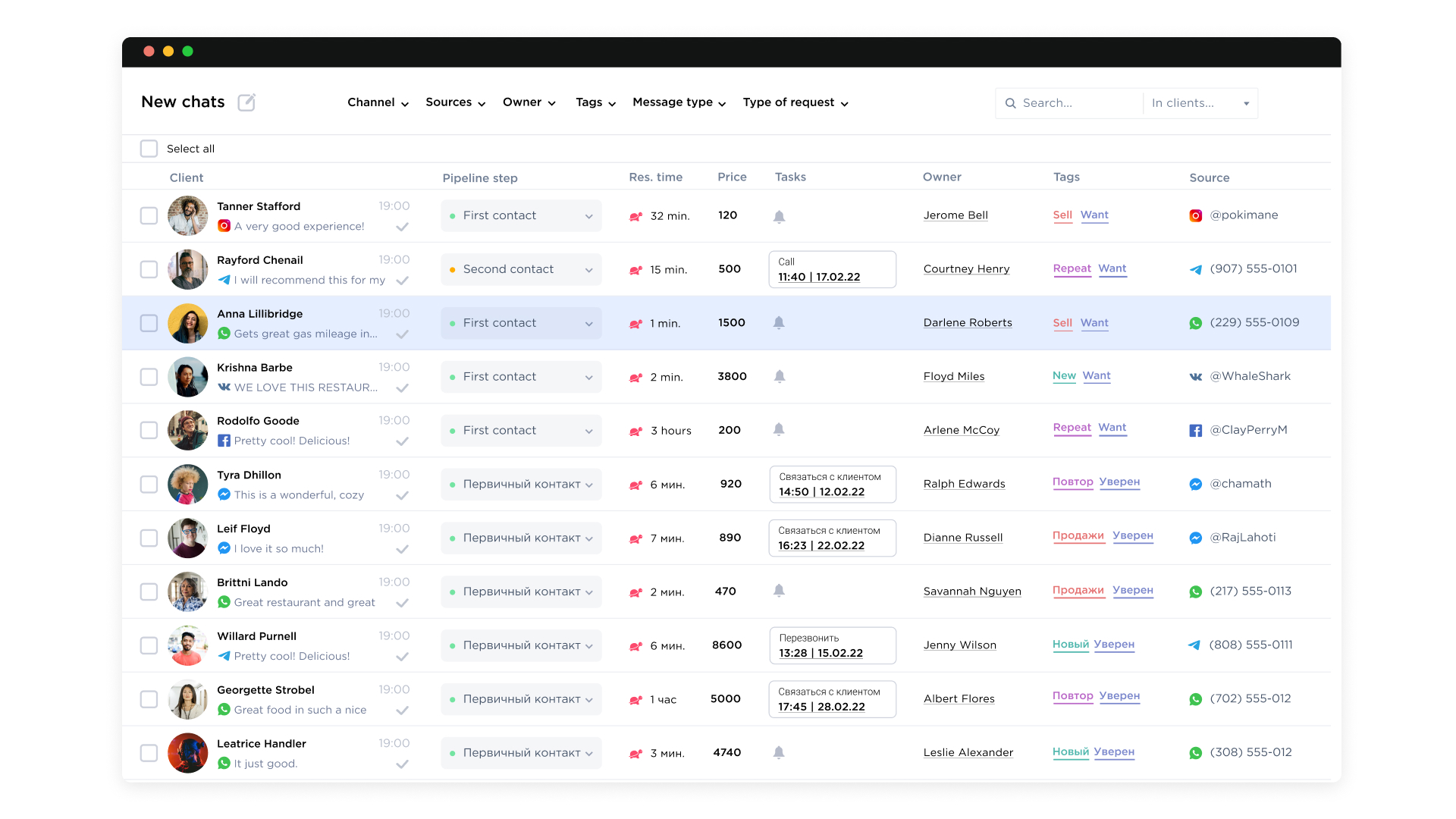
Best customer service practices
Now that we have quite an understanding of what customer service platforms are and their capabilities, it is time to discover the most effective ways of using them.
Role-play customer service scenarios
Devising customer service scenarios beforehand (also known as role-playing), can effectively prepare agents for future interactions with clients. Scripting and acting out support scenarios reduce stress levels during interactions with real customers and help to solve issues faster and more effectively, which inevitably creates a better impression among customers. Approved scenarios can be saved as template responses on the customer service platform for quick use.
Add self-service option
According to studies, 81% of consumers try to resolve issues on their own before contacting customer support. Offering cost-effective and frictionless self-service options is a sound strategy for optimizing customer support while giving clients what they actually want. The best way to do so is to use your customer service platform to set up a knowledge base where clients can find solutions to frequently asked questions, tech specs, and helpful recommendations. To make the knowledge base as useful as possible, pay extra attention to its structure and how the search feature works so that everyone can easily find what they’re looking for.
Improve first contact resolution
How first touch (contact) resolution is handled plays a decisive role in the overall customer satisfaction with how support works. Nobody likes it when their inquiry can’t be resolved during the initial interaction, just as well as when it bounces from one support agent to another as the team tries to find a competent one. Such situations increase churn rate and lower customer loyalty. The best way to avoid this is to carefully analyze any inquiries unresolved during the first contact. Often, the problem lies in poor ticket routing and access to knowledge resources, as well as using several apps to message clients instead of an omnichannel messaging platform.
Put analytics insights to use
It is hardly possible to enhance customer service without keeping records and studying the data gathered by a customer service platform from processing interactions. A holistic approach that includes analyzing both general data related to resolution time and customer rating, as well as more focused insights on particular problems or customer categories, is the best way to improve the quality of your customer service, and, consequently, customer relations.
Make it easy to get in touch
The fewer contact options you provide and the more complicated they are for clients, the more likely it is for them to leave to competitors that are more open for communication. It is not enough anymore for companies to provide support via email and phone only. Employ such channels as social media and messengers to facilitate two-way personalized conversations with clients, promote special offers, and provide post-purchase support. To achieve effective customer communication across multiple channels, consider employing such messaging platforms as Umnico.
Summing things up
Picking suitable customer service management software is an essential step on the road to better customer service and happier clients.Base your decision on the goals you want to achieve, the specifics of your industry, and your budget, of course. If picked right, customer support platforms can dramatically improve the quality of communication with customers and increase sales and conversion rates. Also, an easy-to-use modern solution will make employees happier, which is of no less importance.
For up-and-coming businesses, it is always safer to try new software without long-term financial commitment. Umnico omnichannel messaging platform has all the tools for small and middle-sized companies to achieve efficient customer communication and the customer communication platform can be used for free during a trial period with no restrictions.

Subscribe to Umnico news!
Be the first to get recommendations and up-to-date information
